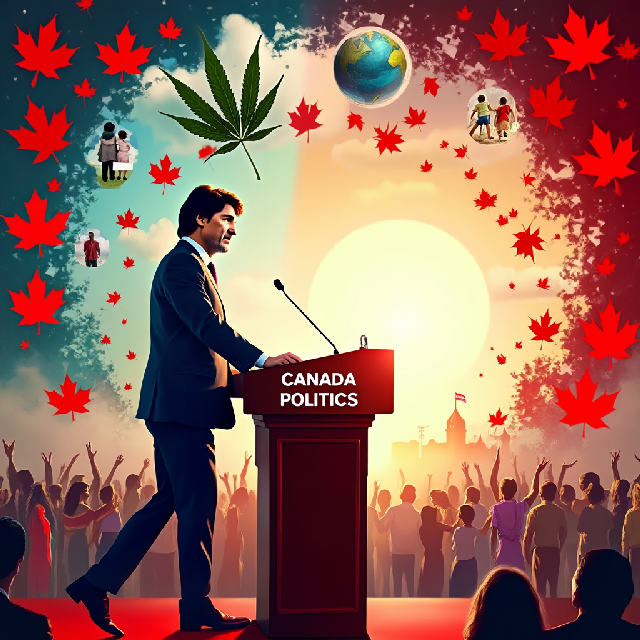Justin Trudeau’s Resignation: A New Era for Canadian Politics
Justin Trudeau’s resignation as Prime Minister of Canada and leader of the Liberal Party marks a significant shift in the nation’s political landscape. After nearly a decade in office, Trudeau leaves behind a legacy defined by progressive policies, youth advocacy, and internal party pressures that ultimately led to his departure.
Policy Legacy: A Progressive Vision
Key Achievements
Trudeau’s leadership was characterized by a commitment to progressive values. Notable achievements include:
- Legalization of Marijuana: A landmark policy that aligned Canada with global trends toward drug liberalization.
- Affordable Childcare Programs: Significant reductions in childcare costs, benefiting over 1 million Canadian families annually.
- Carbon Tax Implementation: A cornerstone of Canada’s climate strategy, generating billions for green initiatives.
- Advancements in LGBTQ+ Rights and Gender Equality: Historic legislation ensuring equal rights and protections.
Criticisms and Unmet Expectations
Despite these achievements, critics argue that some promises fell short. For instance:
- Climate Action: While ambitious targets were set, actions like pipeline purchases drew criticism for conflicting with environmental goals.
- Indigenous Reconciliation: Progress was slow, with critics citing unfulfilled commitments to clean water and education.
Youth Advocacy: A Mixed Legacy
Initiatives That Made a Difference
Trudeau championed youth engagement through:
- Prime Minister’s Youth Council: Providing a platform for young Canadians to influence policy.
- Canadian Youth Policy: Focused on collaboration across government sectors to enhance youth outcomes.
Impact on Political Engagement
- Voter Turnout: Under Trudeau, youth voter turnout increased by 18% in the 2019 election compared to 2015 (Source: Elections Canada).
- Social Justice Movements: His support for climate action and social justice resonated with young Canadians, though some felt expectations were unmet.
Internal Pressures: The Final Straw
Caucus Dissent
Rising dissent within the Liberal Party was a significant factor in Trudeau’s resignation. Reports indicate that up to 30 Liberal MPs were poised to challenge his leadership, reflecting deep ideological differences and frustrations over policy decisions.
Leadership Challenges
- Public Criticism: Senior figures like Chrystia Freeland publicly distanced themselves, signaling a loss of confidence.
- Policy Decisions: Critics pointed to decisions like pipeline purchases as conflicting with progressive values.
Implications for Canada: A New Direction
Shifts in Power
Trudeau’s resignation triggers an internal power struggle within the Liberal Party. The leadership race, set to conclude on March 9, 2025, features candidates like Mark Carney and Chrystia Freeland, each bringing different visions for Canada’s future.
Potential Policy Changes
Key areas that might see changes include:
- Economic Policies: A potential shift toward fiscal conservatism under a new leader.
- Environmental Policies: Reevaluation of carbon pricing and emission targets.
- Social Policies: Challenges to progressive policies on LGBTQ+ rights and immigration.
Visualizing the Policy Landscape
Climate Policy Comparison
| Party | Emission Target (by 2030) | Key Policies |
|---|---|---|
| Liberal | 40-45% below 2005 levels | Carbon pricing, clean tech investments |
| NDP | Aggressive targets | Stronger regulations, worker support |
| Conservative | Moderate reductions | Focus on economic balance |
| Green | Ambitious targets | Comprehensive green initiatives |
Emotional Storytelling: Voices of Young Canadians
“Trudeau’s leadership made me feel heard. Climate action became a priority, and I saw real change.”
– Sarah, 24, Climate Activist
“While I appreciate the focus on social justice, I hoped for more on affordable housing and job opportunities.”
– Alex, 29, Toronto
Binary Opposition Framework: Progressive vs. Conservative Approaches
| Issue | Progressive (Liberal/NDP) | Conservative (CPC) |
|---|---|---|
| Climate Action | Aggressive targets, green investments | Balanced approach, economic focus |
| Social Justice | Strong emphasis on equity | Traditional values, limited intervention |
Conclusion: Trudeau’s Legacy and Its Impact
Justin Trudeau’s tenure has left an indelible mark on Canada. His progressive vision shaped policies and inspired youth engagement, though challenges remain. As Canada navigates this transition, the lessons from his leadership will guide future decisions.

Curious about how Trudeau’s achievements balance with criticism for unmet expectations, especially in climate action and Indigenous reconciliation. These shortcomings might overshadow his successes in critics’ eyes.
I’m curious how Trudeau’s achievements stack up against criticism over unmet expectations, mainly in climate action and Indigenous reconciliation. His failings here might overshadow his successes to critics.
I’m curious how Trudeau’s accomplishments compare to criticism over unmet expectations, especially on climate action and Indigenous reconciliation. Critics argue his shortcomings in these areas overshadow his successes.
His leadership style has also been debated—some see it as too cautious, while others believe he effectively balances boldness with pragmatism. How do these critiques align with his policy outcomes?
Lastly, I wonder if Trudeau’s popularity stems more from charisma than tangible results. Could this gap explain why some supporters feel disappointed despite his progressive agenda?
Trudeau’s accomplishments are often overshadowed by criticism over unmet expectations in climate action and Indigenous reconciliation. Critics may focus more on his shortcomings than his successes.
The pandemic response likely influences public opinion on his leadership, as recent events often matter more to people than long-term policy results.
These factors together make it challenging for some to assess Trudeau’s overall performance as Prime Minister.
The comment questions how the article balances Trudeau’s progressive achievements with criticism of unmet expectations in areas like climate action and Indigenous reconciliation. It asks if such shortcomings might overshadow his successes for critics and if high public expectations make strong policies seem inadequate, making Trudeau’s efforts appear insufficient despite good intentions. The user also wonders if the piece explores why there’s a disconnect between progressive optics and actual outcomes, possibly due to political compromises. Finally, it asks if these gaps might lead critics to view Trudeau more critically over time.